Peter MALONE
Saturday, 18 September 2021 20:01
Eddie the Eagle
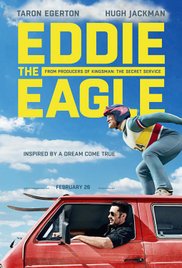
EDDIE THE EAGLE
UK, 2016, 106 minutes, Colour.
Taron Egerton, Hugh Jackman, Jo Hartley, Keith Allen, Tim Mc Inerney, Mark Benton, Christopher Walken, Jim Broadbent.
Directed by Dexter Fletcher.
There’s nothing like a sports film to get the adrenaline pumping, to rouse the spirit, to affirm human qualities and talent – in others and in ourselves.
There are two main kinds of sports film, one the story of a champion, background, skills, challenges and training, achievement; the other is the story of the underdog who, despite all odds, triumphs. Michael Edward Edwards, who received the nickname of Eddie the Eagle from supporters at Calgary, has to be one of the most underdog of underdogs. Sharing in his life, in his impossible dreams, in his persistence and determination, and his achievement, is one of those cinema feel good experiences.
Back in the 1970s, when Eddie was a very fragile young lad, even spending a year in hospital with wonky knees, somehow or other, he got it into his head that he wanted to go to the Olympic Games – all evidence to the contrary notwithstanding, and there is a great deal of evidence of his awkwardness and lack of skills. Then, one day it dawned on him that he wanted to go to the Winter Olympics and that he will ski.
While his mother is forbearing, his father, a workman plasterer, has no times for Eddie’s aspirations. Nevertheless, Eddie seems fairly oblivious to what seemed to be obvious, very obvious difficulties and, while at school, he does actually achieve something in skiing and win some trophies.
Full of seemingly baseless self-confidence, off he goes to a ski resort in Germany, no connections, sleeping in a cupboard and, fortunately, being given a job and some hospitality by a restaurant owner. He tries out some of the jumps, with varying success, to the mockery of the champion Nordics skiers and the wry observations of former champion, Bronson Peary, Hugh Jackman, stubbled, alcoholic, but, as always with Hugh Jackman, a very nice person underneath.
While this particular story is original insofar as there are not so many sports films about skiers, the rest of the film goes mostly according to predictions: terrible falls and injuries, renewed determination, the challenge of Peary, the mockery of fellow jumpers, and the continued acerbic criticism of the British Olympic Ski Association. He perseveres and perseveres; there are quite a lot of training sessions with Peary, which do indicate that Eddie did quite a lot of training and practice, learning some skills, readying himself for the jumps.
He wants to get a qualification that will allow him to go to the Winter Olympics in Calgary in 1988 – despite the British Association. We know that he will succeed otherwise they would not have made a film about Eddie. But, it is the exhilarating experience he had in Calgary, not great jumps but the fact that he did them, and an excited response which endeared him to the crowds and commentators and to dead to do the 90 metre jump.
Pierre de Coubertin, founder of the modern Olympics, is quoted that winning is not everything but participating years – and it is the value of the struggle.
Christopher Walken is heard early in the film and appears at the end, Peary’s former coach who had despaired of him but who comes to acknowledge him and Eddie’s achievement.
The film obviously climaxes on a high – and in the credits, the director acknowledges Eddie and his family. Actually, the film provides an enormous commercial for drinking milk and probably will attract a lot of viewers to skiing and future Winter Olympics.
1. Based on a true story? The 1970s and 1980s? Sport? The United Kingdom?
2. The British tone, emphasis on sport, achievement, the Olympics?
3. The title, Eddie Edwards and 1988, his jump, his performance with wings, the crowd response, the commentators?
4. An underdog film? Eddie as the least likely success? His initial ambitions, the Olympics, talking about them, running away from home at a young age, his father collecting him in the van? His being oblivious to criticisms? The year in hospital for his knees? The various sports, hurdles, weights, his falling? The box of broken spectacles?
5. Growing up, the possibilities for skiing, his success, trophies?
6. His father, work as a plasterer, wanting his son with him? A gawky young lad, loner, no girlfriends?
7. His decision to go to Germany, his eagerness, naivete? Arrival, asking advice of the competitors from Scandinavia, their reactions? Sleeping in the cupboard, Petra helping him, giving him the job, her friendship? The initial accounts encounters with Peary, his truck, jokes, advice, his work?
8. His doing the jumps, the Scandinavian reaction? In the sauna? His clothes, new skis?
9. His talking with Peary, his character, his coach’s book and the voice-over? Perary’s story with his coach? On the team, drinking, the years passing, in Germany, his jobs? The Scandinavian saying he was a disgrace?
10. Eddie clicking with Peary, the bond, the detailed sequences of training, exercises? The attempts at jumping?
11. The British Association, the personnel, critique, mockery, wanting him away?
12. His successful jump, belonging to the British team, travelling, the number of jumps, no British competitors therefore his results as records? Qualifying?
13. His mother and father, his taking the van, travelling with Peary?
14. Peary, the clash with the Scandinavians, the knockout in the fight? His going to the top, his successful jump and their admiration?
15. Eddie qualifying, the association changing the rules? His various attempts at jumping, injuries, in hospital, determination?
16. His going to Calgary, the talking with the Finnish champion, his jump, coming last but his excitement and the response of the crowds? The association not impressed? His carry on, the reactions, the commentators? The other skiers, their leading him on, getting him to drink – rather than his usual milk? His not participating in the opening march?
17. The broadcaster, the commentary, the favourable reviews? The crowds? The press conferences, his secret conference, contrasting with the poor conferences of the better skiers?
18. His determination to do the 90 metre jump, seeing Peary’s coach on the television, Peary hearing it? Peary coming to Calgary, encouraging Eddie, going up the slope, the tension waiting, his decision, the jump, his personal best and a record for Britain? The coach coming and giving his praise to both Peary and to Eddie, writing praise in the copy of his book?
19. The triumphant return, his parents, the crowds, the media – an inspirational story?
Published in Movie Reviews
Published in
Movie Reviews
Tagged under
Saturday, 18 September 2021 20:01
Beasts of No Nation
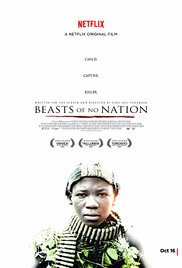
BEASTS OF NO NATION
US, 2015, 137 minutes, Colour.
Abraham Attah, Idris Elba.
Directed by Cary Joji Fukunaga.
Beasts of No Nation is a difficult film to watch, reflecting, as it does, dire situations on the continent of Africa, civil wars between government and rebels – but, especially, the taking of children and training them to be child soldiers. The film was sponsored by Netflix and received its first distribution on that network.
This is not a new theme for films – there Was Johnny Mad Dog with financial support from the government of Liberia. There was also Rebelle – the Cap Witch, filmed in Congo Kinshasa, but set in an unnamed country. In the former film the child soldier was a boy. In the latter, a girl.
One of the outstanding things about Beasts of No Nation is the central performance by Abraham Attah, convincing as a playful young child in his village, lost in the jungle, recruited and brainwashed, becoming vicious, even to hacking an engineer prisoner to death with a machete, wanting revenge on the death of his father – but all the time with a sense of God and saying prayer, even when he is ashamed of his killing.
The bulk of the cast is African with international star, Idris Elba, appearing as the Commander, a man obsessed, loyal to the Supreme Commander, indoctrinating the children, ruthless in his behaviour with them, exploiting and even abusing them, letting them play football, join in singing and communal food, but all the time making sure that they were more and more loyal to him and to his cause.
The film opens in a buffer zone which is soon under siege by both military and rebels, leading to mass exile or to brutal massacre. There are other massacre sequences throughout the film.
The tone changes towards the end of the film when the Commander brings his boys into the city to be praised by the Supreme Commander. This is not what happens. Life in the bureaucratic city is quite different from life in the bush. The Commander is kept waiting, relieved of his post and, allegedly, promoted to chief of security while his 2 IC is placed in command, something which angers the Commander and leads to further brutality.
Ultimately, the Commander is left with his boys inactive in the jungle for months until they themselves rebel against him.
There is quite some pathos as well as hope in the final sequence where the young hero is once again in safe surroundings, with other children, and working with a counsellor to overcome his traumas.
1. The impact of the film? Graphic? An African story? 21st-century? Civil wars and rebellions? Military, political? Child soldiers?
2. The African settings, the village, the buffer zone, the countryside and base camps, the war, battles? Contrast with the city, offices, government? The musical score?
3. The title, Agu and his saying that this was what the children were, that they had become beasts not belonging to the nation?
4. The introduction, the village, the family, Agu and his life, children playing, no school, ordinary life, family? The detail? His older brother, his flirting, interactions between the two? The father and his being a teacher, the mother?
5. The war situation, life in the buffer zone, between the rebels and the government forces, the church gatherings, trying to live an ordinary life? The need for getting out? The father arranging it, the mother and the baby, in the car? The boy having to stay behind? The attack, the rebels, the Army, people caught, the massacres, the father and others rounded up, being killed? Agu and his escaping, his brother’s death?
6. Agu, the screen performance, awards, his character, his age, bewildered, the break from his family? His being found?
7. The troops, their age, using weapons, the Commander and his role, testing the young boys, judging them, the Commander’s ruthlessness and killing the boy who did not meet the standard? The use of drugs? The scenes under the bridge?
8. The Commander, his motivation, character, for and against, his 2 IC, with the rest of the boys, the training, meals, play, football, the indoctrination, the motives of revenge, inciting bloodlust?
9. The political background, the Commander and his loyalty to the Commander-in-chief?
10. The guerrilla warfare, the attacks, the guns, the prisoners, Agu and his being forced to kill, the engineer, with the machete, his reluctance, his mad frenzy and hacking the prisoner?
11. Agu, his belief in God, his prayers, praying as he killed, vengeance?
12. The visual impact of the massacres?
13. The Commander, his relationship with the boys, manipulation, the equivalent of abuse?
14. Going to the city, meeting the supreme chief, having to wait, the Commander feeling insulted, bureaucracy?
15. The Supreme Commander, informing the Commander about the change, his promotion, security? The promotion of the 2 IC? The Commander arranging his death?
16. Going into exile, with the boys, the months passing, the downfall of the Commander, the boys their wanting to revolt? Turning against him?
17. Agu, the end, the boys released, his working with the counsellor, the possibilities of his recovery? Going out to be with the other children?
Published in Movie Reviews
Published in
Movie Reviews
Tagged under
Saturday, 18 September 2021 20:01
Cider House Rules, The
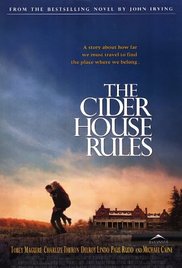
THE CIDER HOUSE RULES
US, 1999, 125 minutes, Colour.
Toby Maguire, Charlize Theron, Michael Caine, Delroy Lindo, Jane Alexander, Kathy Baker, Kieran Culkin, J.K. Simmons, Paul Rudd, Kate Nelligan.
Directed by Lasse Halstrom.
It is 1943, and Dr. Wilbur Larch (Michael Caine) runs St. Cloud’s Orphanage in Maine. He assists in the birth of unwanted children, and he also performs abortions, which he knows are illegal, so women will not have to have back-alley abortions. He is also addicted to ether. He and his nurses care for the orphans with dedication and love. Dr. Larch trains one of them, Homer Wells (Tobey Maguire), as an ob-gyn assistant. Homer was adopted twice and returned to the orphanage both times, and Dr. Larch has become very fond of him. Homer will deliver babies, but he is opposed to abortion.
One day, a young woman named Candy (Charlize Theron) arrives with her boyfriend, Captain Wally Worthington (Paul Rudd), for an abortion. Homer is attracted to their sense of freedom and decides to leave the orphanage with them to see the world. He gets a job as a migrant worker at the Worthington orchard and enjoys his freedom. When Walter returns to the war, Homer and Candy begin a relationship. After the apple crop is in, Homer works the lobster boats for Candy’s father.
Meanwhile, the Board of the orphanage wants a new doctor to join the staff at St. Cloud’s. Dr. Larch falsifies his own resume and diplomas in favor of Homer and promotes him as the new doctor even though Homer has never even been to high school.
A year passes. When the migrant workers return, it is obvious that the young woman Rose (Erykah Badu) is not well. Homer discovers she is pregnant, and then Rose tells Candy that her own father, Arthur (Delroy Lindo), is the father of the baby. Homer offers to take Rose to the orphanage or to help in any way he can. She refuses to go, and he performs an abortion for her.
They receive word that Wally is paralyzed from the waist down because of encephalitis B, which he got after his plane crashed. Candy and Homer end their relationship. Rose runs away, and she knifes her father, thinking he is about to attack her again. In the meantime, Dr. Larch dies from an accidental overdose of ether. Homer decides to return to the institute to take the doctor’s place.
John Irving (The World According to Garp, The Hotel New Hampshire) adapted his novel, The Cider House Rules, for the screen, recreating an idealistic image of a 1940s New England orphanage.
Tobey Maguire (The Ice Storm, Pleasantville, Ride with the Devil, The Wonder Boys, Spider-Man?, Seabiscuit, Spider-Man? 2) creates the shy, earnest, devoted Homer who has yet to discover a world beyond the orphanage. Michael Caine received a second Oscar for his performance as Dr. Larch.
The film captures the seasons of Maine with its scenes set at the wintry orphanage and its rendition of the spring and summer of orchards and the coast. Swedish director Lasse Halstrom is skilled in making evocative movies against striking landscapes, such as My Life as a Dog, What's Eating Gilbert Grape, Chocolat, and The Shipping News.
The movie caused some controversy on its release because of its stance on abortion. The debate became more heated when the film received so many Oscar nominations, including those for Best Picture and Best Director, and when it won Best Adapted Screenplay for John Irving and Best Supporting Actor for Michael Caine. Pro-lifers protested the film.
The novel and the movie both raise serious questions about the social, ethical, and moral dilemmas surrounding abortion in the context of the 1940s as well as in our own times. It tells the troubled stories women who choose abortion, dramatizes the dangers and the risks, and shows a concerned doctor and nurses.
The Cider House Rules takes great pains to show the humanity of those who care for the less fortunate, like orphans. It shows the plight of the victims of incest, the war-wounded, and the workers on the margins of society. It is in this context that the film dramatizes the moral dilemma presented by abortion as an option to solve real problems for real people—but without any sense of transcendence beyond this world or objective morality. The stance of writer John Irving is obviously pro-choice. The movie does offer, however, an opportunity for reflection on the meaning of morality, the nature of the fifth commandment, and the pastoral care of those involved in abortion.
1. The movie dramatizes the oft repeated case for abortion: better to have abortions that are done professionally than by a back-alley practitioner. Candy, the pregnant girl friend, and Rose, the victim of incest, give a human face to the situations in which women find themselves. The legal aspects of the drama concern illegal operations in the context of 1943. Does the 1973 Roe v. Wade decision that legitimized abortions in the U.S alter the moral issues surrounding abortion? Why or why not? Are abortions ever safe? The film fails to address the physical, psychological, and spiritual consequences of abortion, but merely states that the doctor provides what women want. What name is given to this kind of morality? (Relativism and/or nihilism.) What is a Christian response to abortion providers and to the men and women involved, including mothers, fathers, and society as a whole? How do believers in human life from conception to natural death create a dialogue with those who believe that abortion is a right choice? How does the film Vera Drake compare to Cider House Rules?
2. Dr. Larch delivering babies, mothers not wanting to see their babies, the young girl who attempted an abortion and who died; Larch’s attitude toward abortion and the children; Homer’s view and that of the nurses; life in the orphanage; the children wanting to be adopted; those who remain; the meals, the movies, the good night in the dormitories; Dr. Larch’s addiction. Its view of the human person is ambiguous—much like the view expressed in The Cider House Rules. How does Dr. Larch view the human person? How does he view unborn children? What was the meaning of his drug use? Does this film reflect contemporary society? Why or why not? How is the Christian view of the human person best expressed? What is the culture of life? What place does artificial contraception have in the culture of life? What does this culture of life involve, and what role does philosophy play in creating a consistent culture of life?
3. What were the “cider house rules”? What kind of morality was expressed by the migrant crew? What is Gospel morality, and what are ethics? How are they the same or different? Think about each of the main characters in the film and their approach to morality and decision-making in their lives: Dr. Larch, Homer, Candy, Wally, Rose, Arthur, the nurses, Jack. How is freedom expressed in the film? Are any of the characters truly free? Which ones and why? Do you think that the prayers of the doctor, nurses, and Homer at the orphanage are sincere? How do believers communicate a culture of life in a culture that does not hold the same values? What is a pastoral approach to people considering abortion or to people who have had one? How are charity and truth, freedom, and responsibility balanced in God’s love?
4. Candy and Wally and the reasons for their decision to have an abortion; the procedure and the after-effects; Homer's decision to leave the orphanage to find the freedom of the outside world; getting a job at the orchard and falling in love with Candy.
5. Rose’s situation, Homer's diagnosis; Candy talking to Rose and finding out about the incest; Homer's decision to do the abortion and his reasons; the abortion, Mr. Rose's death, Dr. Larch's death and Homer's return to the orphanage
Published in Movie Reviews
Published in
Movie Reviews
Tagged under
Saturday, 18 September 2021 20:01
Every Secret Thing
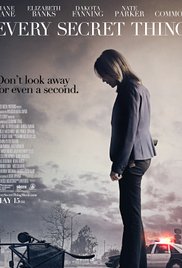
EVERY SECRET THING
US, 2014, 93 minutes, Colour.
Diane Lane, Elizabeth Banks, Dakota Fanning, Danielle Macdonald, Nate Parker, Common.
Directed by Amy Berg.
Every Secret Thing is quite an effective crime drama, different from the usual. The focus of attention is on two young girls who are accused of abducting a mixed race baby, and of murdering it, charged and experiencing seven years in prison and then getting out to start their lives again.
The cast is strong with Diane Lane as one of the girl’s mother, a hard woman, especially with her daughter, not really loving her, and having to cope with her being fat. On the other hand, she’s devoted to her daughter’s friend, liking her much more than her daughter. Elizabeth Banks is the detective who found the original baby and is handling this case, interrogating the two young women. Nate Parker is her assistant.
The adult girls are very well played especially by Australian Danielle Macdonald as the fat girl whose secrets are gradually revealed. The other girl as an adult is played by Dakota Fanning.
The screenplay gradually reveals a number of secrets but it also has the device of flashbacks showing each of the girl’s version of what happened, contradictory versions, leaving it to the audience and the police to work out what was the truth.
The film has strong credentials, especially with the contribution of women, Frances Mc Dormand as producer, Nicole Holofcener (Friends with Money, Please Give, Enough Said) as writer and documentary director, Amy Berg (Deliver Us from Evil) as director.
1. A crime story? Detection? Human interest with the abduction of babies? The needs of the girls in abducting?
2. The American town, families, children, swimming pools, babies in prams on verandas? Prison sequences? Shops and stores, the streets, suburbia, the police precincts? Ordinary situations and environment? Differences? The musical score?
3. The title, Ronnie and her secrets, Alice and her secrets, her mother’s secrets?
4. The prologue, Alice and her mother, not wanting to go to the party, the party at the pool, Ronnie and the gift, slapping the mother, the mood of the event? The two girls going home, the baby on the veranda? The device of having the news headlines, the abduction, the death, the arrest of the girls, charges, imprisonment?
5. The flashbacks to the scene of the crime, the abduction of the child, hiding it, feeding it? The different points of view of each of the children? The ambiguity of the truth? The motivations, fears about the child, no fears, the child dying? Nancy Porter and the flashbacks to her finding the hidden child?
6. The picture of Alice, a self-centred girl? As a little girl, in the flashbacks of the party, the abduction, her interactions with Ronnie, her control over Ronnie, blaming her? Her being fat and her referring to this? Not being liked or loved? Her relationship with her mother? In prison, not contacting Ronnie? Getting out, at home, her mother urging her to get the job? Her walking the streets seemingly aimlessly? The disappearance of the child, the police interrogations, her mother’s questions? Her reaction? Her version of the story? The gradual revelation of the sexual encounter in prison, her fostering and enjoying the seduction, her pregnancy, the baby taken, adopted, and not getting any information? The father arrested? The effect on her, wanting her child, walking the streets searching for her? The importance of her mother’s story to the police, encouraging her at the time of the pregnancy, the birth, the adoption, the little design of a heart on the back? Alice and her blaming Ronnie, audiences judging the truth? Her confession to the police, getting the father to give it to his mother to hide, the finding of the baby, Nancy and the offer to help her? Going on television, the prison worker and her accusations, putting herself as a victim, wanting to live her life, his being behind bars? Her future?
7. The contrast with Ronnie, disturbed as a child, her parents? The flashbacks, her version of what had happened, blaming Alice? Getting out of jail, hard, the job and her work, the customers and the cash and cheque? Her lenient boss? No contact with Alice? The police coming, her running away, hiding where the initial baby had died? Nancy finding her? The going to visit Alice’s mother, the mother and her fondness for Ronnie? In the bath, her blood, her death?
8. Nancy, as a detective, finding the baby? The new case? Her commitment? The coldness with her husband at home? Going out, with each of the girls, trying to persuade them to talk? In the night, finding Ronnie where she had found the baby? The further discussions, the discussions with Alice’s mother, listening to Alice’s mother tell the story – confronting Alice, going to the house and restoring the baby to the couple?
9. The assistant, working with Nancy, hard? Phone calls, getting documents, Alice’s file and the discovery of her pregnancy?
10. Mrs Manning, in herself, early pregnancy, despising the father, the effect on Alice as a child, fat, her mother loving her or not? The prison experience? Urging her to get a job, questioning her about working? Her hard attitude towards the police? The contrast with her kindness and fondness for Ronnie? Telling the truth about the baby, telling Nancy the details of Alice’s behaviour and attitude? Standing behind Alice’s final interview but walking away anonymously?
11. The concerned local woman, her baby, memories of the past, going to the police, the bad reception from the partner of the woman whose baby was abducted?
12. The couple, in the store, the baby gone, reaction to the police, the partner and his hostility, the mother and her concern? The joy of getting the baby back at the end?
13. The title – and everybody’s secret?
Published in Movie Reviews
Published in
Movie Reviews
Tagged under
Saturday, 18 September 2021 20:01
Party Girl/ Angelique
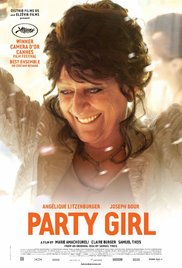
PARTY GIRL/ ANGELIQUE
France, 2014, 96 minutes, Colour.
Angelique Litzenburger, Joseph Bour, Samuel Theis, Cynthia Litzenburger, Severene Litzenburger.
Directed by Marie Amachoukel, Claire Berger.
This film won a number of awards including the Camera D’ Or for a first film at Cannes.
The film was largely improvised, the characters, many of them Litzenburgers, were placed in situations and allowed to improvise their dialogue and their interactions.
The focus of the film is a 60-year-old prostitute, Angelique, who has lived a party life, gets on well with the other prostitutes, does her business in a bar with strip dancers, all part of her rough life for many years – although, we find that she has four children, three adults, a daughter married, and a 16-year-old daughter who was fostered.
A worker, Michel, proposes to her and she ponders whether she should marry him or not, making a decision, the two being happy together, her going to consult her family, but still having doubts and not sexually attracted to him. However, the marriage goes ahead with all the children present, making speeches, the happiness of the ceremony, exchange of rings, the dancing. But, at her going home with Michel, she finds she cannot respond to him sexually, says she does not love him. The impact on Michel is strong, humiliated and angry, and she leaves, wandering the streets, going to the club, enthusiastically dancing – and what will be her future?
1. The title? The outgoing type? The focus on her name? Her age?
2. The setting on the French German border, the clubs and the streets, homes, the Mayor’s office, the church? The musical score?
3. The film and its awards? Its style, the basic story, outline of the plot, the actors taking on their characters and improvising their dialogue and scenes?
4. The focus on Angelique, her age, her appearance, clothes? Her background as a prostitute? But also her background with men, her four children? Her friends, going out on the town, the dialogue, their friendship, support of her?
5. The bar, the dancers, the proprietor, the clients, Angelique and her approaching the men, favourable, the man calling her a whore and the violent reaction?
6. Her drinking, camaraderie with her friends?
7. Michel, his age, past client in the bar, knowing Angelique for some years, in love with her, the proposal, taking her out?
8. Her indecisiveness, consulting her friends? What marriage would mean with consequences?
9. Her reaching out to her children, visiting homes, the discussions, the daughter with her family, the son who worked in the mines? The contact with Sam, asking his advice? Reaching out to the daughter that had been fostered? The ups and downs of the conversations, writing letters, making contact?
10. Angelique and her travelling to see the daughter, age 16, the friendly foster mother, the daughter and her past, being moved by her mother’s visit?
11. Michel, the outings with Angelique? Yet her sexual resistance? Her talking this over with friends? Her appreciating his friendship, but not in love with him?
12. The buildup to the wedding, the visit of the mayor, the documents? The preparation for the ceremony, the wedding dress? Everybody in the church? The ceremony, the priest, the exchange of rings? The car, the celebration, the speeches from the children, the dancing?
13. At home, her sexual resistance, her blunt speaking to Michel, his being humiliated, angry, striking her?
14. Her leaving, walking the town, going to the club, dancing – and what future?
Published in Movie Reviews
Published in
Movie Reviews
Tagged under
Saturday, 18 September 2021 20:01
Bad Blood/ 2015
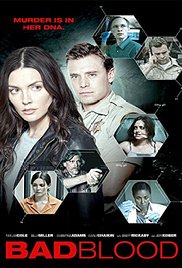
BAD BLOOD
US, 2015, 87 minutes, Colour.
Taylor Cole, Billy Miller, Christine Adams, Brett Rickaby, Jeff Kober, Neil Brown Jr,
Directed by Adam Silver.
This is a serial killer thriller. The focus is on a young woman, who is revealed to have rather dubious background, in juvenile detention and under the influence of her criminal father who abandoned his family and whose absence she resents. She has a relationship with the local sheriff, some good friends in the town, but a fussy landlady who is murdered.
She is a suspect in the crime and is arrested, interrogated by the sheriff who is upset, critical of the expert who comes in for forensic examination.
The audience knows who the killer is, a man dependent on blood transfusions, getting them from his wife, then murdering women to harvest their blood. It is later revealed that he has had a bone marrow transplant from the heroine and is intent on getting her because their blood has the same DNA.
The film is also something of a chase, the authorities after the woman, who escapes to be with her father, working with him, going to the hospital to discover who the killer was, rescuing her friend who has been taken – with a shootout involving the forensic expert as well as her father.
A brief thriller but effective while it is there.
1. A serial killer thriller?
2. The town, homes, police precincts, the surrounding countryside? The feel? The musical score?
3. The title, the credit sequences and the blood cells? The theme of blood? Oscar Marcus and his illness, the bone marrow transplant, the DNA from the donor, his visits to the doctor, chemotherapy, getting blood from his wife, her death? The revelation of other women and his taking their blood? The need to get to Lauren Malone? Her being the donor? The theme of blood and the killing of the police deputy, her being laid out the like the angel in the drawings?
4. Lauren’s story, the landlady and her dog and her criticisms, out jogging, the encounter with a sheriff, the relationship, his proposal, waiting for her with the ring, her looking, leaving, driving around, talking with her friend, the news of the murder of her landlady, the police, the arrest, the interrogation, the attitude of the sheriff? Tommy Bates and her forensic examination? Lauren being sent in the van, the roadblock, Oscar and the confrontation, the shooting of the deputy and taking her body, imprisoning Lauren?
5. Oscar, his story, the room with his wife, gagged, taking the blood, the stock of blood, her death? His visit to the doctor? His self-preoccupation? Getting Lauren, the cruelty? Laying out the deputy like the angel in the drawing? Abducting Lauren’s friend, tying her up, the blood? Lauren, her escape? Her return, the confrontation – and the revelation of his son?
6. The sheriff, in love with Lauren, the evidence, wary of Tommy Bates, the interrogation, her escape, the search for her father, his presumptions?
7. Tommy Bates, forensic examination, the clash with the sheriff? The death of the deputy? Her suspicions, the doctor coming to the precinct, the CCTV, the photo, her interrogation, tracking down Oscar, leaving, confront him, her being shot? In the ambulance, to recover?
8. Lauren, the escape, tracking down her father, the back story, in juvenile detention, the stealing of the cars, her mother’s death from cancer, her father’s absence and making mistakes, his going to jail? His not being there for her – except when he asked her to steal the car with him? The interactions between the two, his wanting to support her, the gun? Going to the hospital, the information from the doctor? Going to confront Oscar, his leading the sheriff away from Lauren in the house? His being taken? Refusing to answer questions?
9. The buildup to the confrontation with Oscar, Lauren with the gun, his gun, shooting Tommy Bates, Martin arriving, the explanation of the drawings? Lauren’s father and his shooting Oscar?
10. Lauren and her friend her friend?
11. The resolution of the case, Lauren jogging – and the sheriff following?
Published in Movie Reviews
Published in
Movie Reviews
Tagged under
Saturday, 18 September 2021 20:01
Black or White
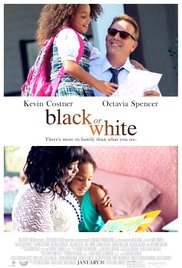
BLACK OR WHITE
US, 2014, 121 minutes, Colour.
Kevin Costner , Octavia Spencer, Jillian Estelle, Anthony Mackie, Andre Holland, Jennifer Ehle, Gillian Jacobs, Paula Newsome.
Directed by Mike Binder.
Black or White is a serious film about family issues. As the title suggests, it is also a film about American racism. The comment was made that initially the film was called Black and White but changed to the more effective use of “or”.
The film is a personal project for Kevin Costner, investing, in being a producer, taking the central role. The screenplay was written by the director Mike Binder, with whom Costner had worked in The Upside of Anger. The film also features Oscar-winner for The Help, Octavia Spencer. There is strong support from Anthony Mackie as the family lawyer and Andre Holland as the crack-addict father. The little girl at the centre of the custody case is played well by Jillian Estelle. Jennifer Ehle appears briefly into flashback sequences.
At the core of the film is a custody case, Kevin Costner as the grandfather who has helped bring up the little girl wanting custody while the family of the father, led by Octavia Spencer, fight for custody.
The key to the film is in a speech in court by Costner raising the situation above racial issues to family issues and responsibility.
1. The title? Black and white? Black or white?
2. Kevin Costner and his involvement, investment, concern about issues? Performance?
3. An American story, White Americans, African- Americans? Impact within the US? Outside?
4. The situation, characters? Audiences identifying?
5. Characters both good and bad aspects of character, with flaws, the possibility of acknowledgement of flaws, change? The impact on children?
6. The prologue, Carol, her momentary flashback appearance, the apparition in the swimming pool? Her death, the accident? Elliott, the impact, with his friend, Rick, support and advice, concerned about Eloise? At home, his drinking, waking him up, preparing her for school, taking her, lost trying to find the school? In the afternoon, in the park, explaining what it happened? The situation for Eloise, her mother dying in childbirth? Her father a crack addict and leaving? His family and the links with him? Her wanting to stay with her grandfather?
7. Elliott, his work, his friend, his reaction to Fay, her attempt to give a gift? At home?
8. The funeral, the wake, his reactions? Rowena and the family present? The situation between the two families? The tension? Visits? Reactions?
9. Elliott and his interview Duvan? Duvan and his credentials, the range of papers, the range of subjects? The tutorials with Elliott and Eloise, mathematics? His accompanying Elliott on the visits?
10. The custody issue, Reggie and his family, the influence of Rowena? The different stances?
11. Going to court, the judge, the petitions, the interviews, the speeches? Audiences taking sides?
12. The race issues, the family issues?
13. Rowena, her strong influence? Her concern about her son? Granddaughter?
14. Reggie, his history, abandoning his family, crack addict, taking money from Elliott? The clashes with Elliott, the arguments, taunting Elliott about his drinking, the fight,, Reggie upstairs, saving Elliott’s life after Elliott imagining his wife saving him from the pool?
15. The effect on Elliott, his powerful speech in the court, putting aside race issues, focusing on human issues, irrespective of colour?
16. Rowena’s brother, as lawyer, his presentations in court, attack on Elliott?
17. The decision, Reggie and his acknowledging the truth, forfeiting his claims to Eloise, the possibility of change? Going to rehabilitation?
18. Elliott, the victory, Rowena’s intervention and agreeing with Elliott to have Eloise? Elliott deciding to go to dry out, entrusting Eloise to Rowena and the family?
19. The final impact, United States, racial tensions, family tensions, drug and alcohol? And the significance for the influence on children?
Published in Movie Reviews
Published in
Movie Reviews
Tagged under
Saturday, 18 September 2021 20:01
Captain America: Civil War
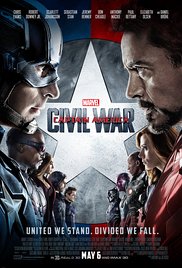
CAPTAIN AMERICA: CIVIL WAR
US, 2016, 147 minutes, Colour.
Chris Evans, Robert Downey Jr, Scarlett Johansson, Sebastian Stan, Anthony Mackie, Don Cheadle, Jeremy Renner, Chadwick Boseman, Paul Bettany, Elizabeth Olsen, Paul Rudd, Emily Van Camp, Tom Holland, Alfre Woodard, William Hurt, Martin Freeman, Marisa Tomei, John Slattery, Hope Davis, Frank Grillo.
Directed by Anthony Russo, Joe Russo.
Captain America has the title role, Tony Stark as Iron Man Man has almost equal importance. But, basically, this is a reunion of the Avengers (with the notable absence of Thor and of the Hulk). It is also a continuation of the narrative from the previous Avengers film, Avengers: Age of Ultron. The fight and devastation of the previous film is taken up as a theme here, preying on Tony Stark’s conscience when he is confronted by the mother of an American worker killed with the collapse of a building, but also providing the occasion for a new villain, a man who saw his wife and family killed in the attack and who is now bent on revenge.
The underlying theme is that of taking responsibility for actions.
Audiences need to bring their understanding of Captain America (Chris Evans), his history during World War II, his being preserved in ice, his recovery and revival, the previous two films and the emergence of Winter Soldier, his friend from boyhood in Brooklyn. Winter Soldier (Sébastian Stan) also gets more elaborate back story, revived by the Russians in 1991, a code implanted whereby he becomes a killer for the agency controlling him. And he is set up for the murder of an African king and delegates at a United Nations meeting in Vienna.
When the film introduces Tony Stark (Robert Downey Jr), there is an interesting hologram device of his interaction with his parents, his strict father, and their farewell just before they were killed in a car accident – later revealed to be more. He is still the philanthropist, and involved with the Avengers.
There is an elaborate attack staged in Lagos, involving many of the Avengers, lookouts, communication, fights. It is this that is the occasion for the American government, In the form of Secretary Ross (William Hurt) and the formulation of a document to be signed by The Avengers putting them under the control of the United Nations. Tony Stark agrees. Steve Rogers, Captain America, does not agree, which sets them on a path to conflict (not exactly Civil War).
After the bombing of the United Nation’s building in Vienna, a new Avenger is introduced, the son of the King, Panther (Chadwick Boseman – who is also getting a film of his own).
In the conflict between the two sides of the Avengers, some of the others are brought into the action including Don Cheadle’s War Machine, Paul Rudd as Ant Man, Jeremy Renner is Hawkeye. Scarlett Johansson as Black Widow sides with Tony Stark but also wants to be a mediator.
Tony Stark also goes on a recruiting mission which gives us a longish interlude with the new Spiderman introduced, younger than before, played by British Tom Holland, with a glimpse of Marisa Tomei as Aunt May. Peter Parker is happy to be recruited and joins in the conflict – which has people flying around, Captain America with his shield, Wanda (Elizabeth Olsen) with her fiery hands, the android Vision (Paul Bettany) also involved – and Ant Man doing a trick or two both reducing his size as well as becoming gigantic!
Daniel Bruel is the new villain, wanting to use Winter Soldier for getting his revenge and building up a conflict between Captain America and Iron Man. The film doesn’t exactly come to a climax except for the battle between Captain America and Iron Man – rather, as with so many of the films, it lays the ground for future sequels which, judging by audience response, will be most welcome.
1. Marvel Comics and their output? The film versions? Avengers? Captain America?
2. Production values, IMAX, 3 D, the setting in Lagos, Berlin, Leipzig, Vienna, Russia in the snow, Washington? Colourful? The musical score?
3. The continuity of this film, Slovokia, the action there, the deaths? Issues of life and death, good versus evil, the law, control? The issue of United Nations control?
4. The title, the focus on Captain America, his three films, presence in the Avengers series? His history, the 1940s, World War II, preserved in the ice, discovered, a 21st-century mission? Confrontation with evil? His clean cut appearance, work with the group? His going to Peggy’s funeral, his grief, memories? Meeting Sharon, the discussions, her help in providing information?
5. Iron Man, Tony Stark and the previous films, his participation in the Avengers series? Introduced giving the lecture, the hologram about his younger self and interactions with his parents, clashes with his father, urging of his mother? Their deaths? His audience, the presentation of the grants, the applause? The mother and confronting him in the corridor about her dead son? This preying on his conscience?
6. The situation in Lagos, the Avengers and their mission, the various lookouts, communication, strategies, the attack, The Falcon, The Black Widow, Wanda, Captain America, all in action, coordinated, the fights, their skills, the number of deaths? The role of the king and his denunciation? His son?
7. Ross, the American government, the gathering of the Avengers, reviewing the situation, the deaths, the need for control, the decisions, the document and its preparation, some agreeing to sign, others not?
8. Vienna, the buildings, the meeting, the King and his son, meeting the Black Widow? The discussions, reconciliation? His speech? The bomb and his death? The grief of his son?
9. The sequence in Russia, 1991, the background of Winter Soldier? Barnes, his resurrection, the codes, his being used by the government, the accident with the car, the revelation that he killed Tony Stark’s parents?
10. His presence in Vienna, the elaborate chase, the cars, bikes? The intervention of Panther? Barnes being taken, imprisoned, interrogated?
11. The interrogator, his mission, his search for Barnes, torture and death after interrogation, the book, the code? His killing the official interviewer? Barnes, the escape, the pursuit, information about his whereabouts, going to Russia?
12. Vision, in himself, invented by Tony Stark? His keeping guard on Wanda? His explanations, android? The call to Hawkeye? His history of collaboration, married with family? His coming at the invitation?
13. The Avengers and the taking sides, Iron Man and his wanting to sign the document, Black Widow and her support, War Machine? Getting the help of Ant Man? Peter Parker? Captain America, The Falcon on his side, Wanda, Hawkeye? In their costumes, their particular abilities, the conflict?
14. The interlude with Peter Parker, meeting his aunt, Tony Stark talking with him, Spiderman and his exploits, visualised, his talent, his web? The offer to him to come to help?
15. The battle sequences, conflict, each of the Avengers using a particular skill? Captain America and his allies being imprisoned, in their cells? The Black Widow letting the Captain go?
16. Ross, his demands on Tony Stark, 36 hours deadline?
17. Captain America, going to Russia, the situation there, the revelation of the other Winter Soldiers, their deaths? The interrogator, his
overcoming Captain America, Barnes? The reversal of roles? Iron Man arriving? The fight, Iron Man discovering the truth about his parents?
18. The capture of the interrogator, in his cell? The American interrogating him? The set up for the further sequel? And for further films, especially Spiderman? The epilogue at the end of the credits?
19. The multiplex audience liking this kind of action adventure?
Published in Movie Reviews
Published in
Movie Reviews
Tagged under
Saturday, 18 September 2021 20:01
Northanger Abbey
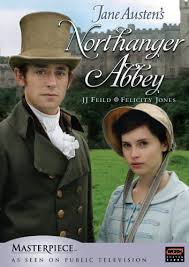
NORTHANGER ABBEY
UK, 2007, 84 minutes, Colour.
Felicity Jones, Carey Mulligan, J.J.Feild, William Beck, Liam Cunningham.
Directed by Jon Jones.
During the 21st-century period of the 200th anniversary of Jane Austen’s novels, there were a number of film versions and, especially, television versions in the United Kingdom. This is the television version of Northanger Abbey.
It is very brief, as was the original novel, the last of Jane Austen’s to be published but first written. it has the expected romantic heroine, her family with financial difficulties, going into society, encountering men, shocked at personal betrayals, falling in love…
Catherine is nicely played by Felicity Jones who was to go on to a successful career and an Oscar nomination for The Theory of Everything, Stephen Hawking’s wife. Also in the cast is a young Carey Mulligan, also to move to a substantial career. She is the fickle and flirtatious friend. J.J.Feild is the parson, Tilney, courteous to Catherine and her friends, a parson expected to marry well, especially in the views of his stern father, General Tilney, Liam Cunningham.
The film has attractive presentations of the countryside, of society in Bath, the carriages on the streets, the ballroom, as well as the countryside around the imposing Abbey.
The film also has some satire on the romantic novels of the period, the Gothic touch with sexuality, melting heroines, dominating heroes, especially those of Mrs Radcliffe. Catherine reads passionately, imagines situations, herself in the novels – but, ultimately, making rash judgement about General Tilney and her being ousted from the Abbey, she burns the book.
1. The popularity Jane Austen’s novels? Her plots, characters? 200 years later?
2. The settings, English counties, the countryside, homes? The city of Bath, society? Northanger? Country, the score?
3. The status of Jane Austen’s films, this television film?
4. Jane Austen heroines, young women, interest, strong romantic, proper, their status, financial situation and society, friendships, the variations on these themes?
5. Jane Austen, who views on the contemporary romantic novels? Those of Mrs Radcliffe? Passion, sexuality, the imagination? The visualising of Catherine’s dreams?
6. The romantic novels, affecting Catherine’s behaviour and opinions? The consequences and her suspicions of General Tilney? Her final burning of the book?
7. Jane Austen’s voice-over, the description of Catherine at the beginning and the end? As a child, plain, playing with the other children, relationship with her parents, family life, growing up?
8. The visit of the Allens? Their request, her going to Bath, their wealth, their home, place in society, looking for a seat at the social, Tilney helping, his conversation? Catherine encountering Isabelle, the friendship? Her engagement to James? The presence of Thorpe, his manner, Catherine and the dances?
9. Tilney, his character, parson, relationship with his father, his older brother, Eleanor? His courtesy, the attraction to Catherine, the irony of his expectations for a lucrative marriage?
10. Thorpe, issues of money, his advice to the General? The character of the General, stern, his attitude, inviting Catherine to the Abbey, the story of his wife, her portrait in the room, his not wanting people to enter? His stern manner? His wife’s illness, his treatment of her? Catherine’s response, novelist imagination? Going to the room, being discovered, the clash with Tilney, his anger, her journey home?
11. Isabelle, in Bath society, having no income, flighty, friendship with Catherine, engagement to James? Seeing the older Tilney, military, flirting with him? Her clash with Catherine, going with Tilney, the sexual encounter, being discarded – and the comment that she would recover?
12. The older Tilney, military, character, women, Isabelle, using her, the clash with his younger brother?
13. Catherine, enjoying Bath, proper, shocked at behaviour, the break with Isabelle, going to the Abbey, the walks with Eleanor, enjoying the visit?
14. Tilney and his anger, Catherine leaving, travelling in the coach?
15. Catherine at home, telling the stories to the children, Tilney arriving, his courtesy towards the family, to walk with Catherine, proposal – and a happy ending, Jane Austen style?
Published in Movie Reviews
Published in
Movie Reviews
Tagged under
Saturday, 18 September 2021 20:01
Special Treatment/ Sans queue ni tete
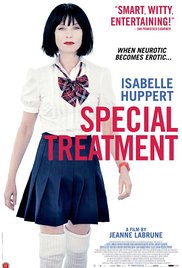
SPECIAL TREATMENT/ SANS QUEUE NI TETE
France/Belgium, 2010, 95 minutes, Colour.
Isabelle Hppert, Bouli Lanners, Sabila Moussadek, Mathieu Carriere.
Directed by Jeanne Labrune.
The idea is probably more successful than the execution in Special Treatment (with its original title indicating, cock and bull). Not that it is not an interesting film with some fine performances, but it is more than bit schematic in its structure and the characters are often more enigmatic than real.
That said, the film’s main thesis (and it is a thesis) is that there may not be much difference between the prostitute and the psychotherapist in their dealings with their clients, working with their minds, the subconscious and conscious, taking money for services which allegedly are improving the client. We see something of both, though the film is suggestive of eroticism rather than erotic and suggestive of therapy rather than offering psychological insights.
We are introduced to Alice, making salacious puns in an antiques shop and taunting the owner. We discover that she is a prostitute with her own apartments and discreet contact with clients, some of whom she likes, others not, and adapts her interactions with them to their own fantasies. The poster has her dressed like a schoolgirl, which she does for one of the men.
We are introduced to Xavier, a rather pompous psychiatrist, who bores peoples at parties, talks shop, to the aggravation of his wife who is falling out of love with him. We see him at work, sitting behind his patient (clients of both professions lie down in their sessions), communicating boredom to the audience, with not even an ‘mmm’ to the patient’s stream of consciousness. He is probably thinking of some artwork he can now afford – as does Alice who likes beautiful objects in her flat.
There are several other characters, prostitute friend, clients, other psychiatrists. Since Alice is beginning to self-question, she approaches a mutual friend of herself and Xavier and seeks out the possibility for some therapy. Not everyone wants to take her on. Particularly interesting (and the film comes more alive) is an encounter with a doctor who works at a hospital for the mentally disabled, a good man with his patients. She has an outburst against him, alleging that he is refusing her because of her profession. However, he and some of his patients, serve as a catalyst for calming her down. In the meantime, Xavier has calmed down and reunion with his wife seems more than a possibility.
Bouli Lanners is convincing as the therapist in need of therapy. But, any film with Isabelle Huppert is dominated by her. The same here. She has made many, many films since the mid-1970s but is still one of the world’s most telling actresses. She must be as the film ends with a long close-up of her face – enigmatic and challenging.
1. The title? The slang French title?
2. Paris, the city, the world of the prostitute, her work, affluence, clients? The world with the psychologist, clients, social life? The musical score?
3. The idea of paralleling the two professions, helping capacity, interactions, payment? The world of sex, avoiding explicit material? Alice and Xavier?
4. Alice in the world of prostitution, the performance by Isabelle Huppert, her age, experience, covering her age, the range of clients, her costumes, role-plays, the schoolgirl…? The clashes with the clients? The cold manner, the payment, the contracts? In herself, her life, at the shops, collecting antiques, identifying the clients by the money which she would pay for an antique? Her friendship with Juliette, prostitute, younger, relationship, confiding in her, support?
5. Xavier, age, portly, his work, alienation from his wife, her being also a psychologist, the marriage breaking, socials and his talking about his work?
6. Alice, discussions about going to a psychiatrist, interactions with Pierre?
7. Xavier, recommended to go to Alice, the interactions with her?
8. How affected was Alice by the interactions with Pierre, with Xavier, questioning her life?
9. How affected was Xavier, the interactions, reconsideration of his life, possible reconciliation with his wife?
10. The symbolic sculpture of the angel and its significance?
Published in Movie Reviews
Published in
Movie Reviews
Tagged under